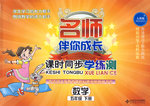题目内容
-- Could you say that again? I can hardly __ what you said just now.
A. imagine B. Control C. see D. change
练习册系列答案
 名师伴你成长课时同步学练测系列答案
名师伴你成长课时同步学练测系列答案
相关题目
题目内容
-- Could you say that again? I can hardly __ what you said just now.
A. imagine B. Control C. see D. change
 名师伴你成长课时同步学练测系列答案
名师伴你成长课时同步学练测系列答案